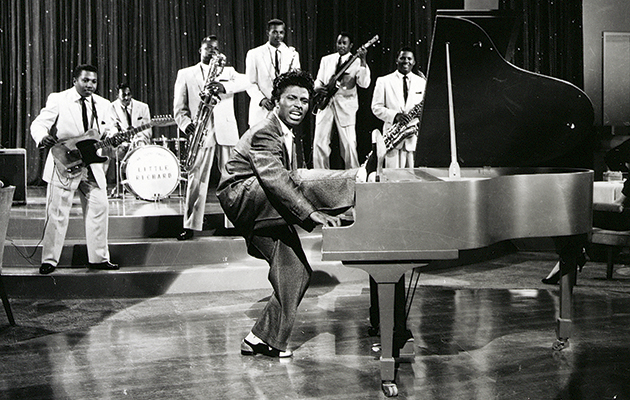To modern-day listeners, Little Richard’s seminal singles may sound quaint and lo-fi, distant echoes from another century. But in mid-’50s America, a society deeply divided by race and ideology, “Tutti-Frutti”, “Long Tall Sally”, “Lucille” and the rest of Richard Penniman’s breakout singles hit with the force of a neutron bomb. For me, growing up in Atlanta, the point of impact is precise and indelible. During a visit to a friend’s house in the summer of 1956, I happened upon a portable record player with a single bearing a bright yellow label sitting tantalizingly on the platter, impulsively dropped the tonearm onto “Rip It Up” and was propelled into puberty in the space of 2:25. Countless members of my generation had similarly vivid transformative experiences dancing ecstatically to Little Richard records, as the Unholy Trinity of the Georgia Peach, Elvis and Chuck Berry combined to trigger a change so radical and absolute it had no precedent.
But Richard Penniman was an unlikely agent of change on such a grand scale. One of 11 kids in a Macon, Ga., family, he was effeminate and gimpy, having been born with one arm and leg shorter than the others, making him the target of constant psychological and physical abuse, his bootlegger dad being one of the abusers. Richard’s sanctuary was the Seventh Day Adventist services he attended with his family, singing in a voice so loud and attention-getting that during a Sister Rosetta Tharp concert he was brought on stage by the headliner, who then paid him for the impromptu performance. And in that moment, the story goes, Richard realized that showbiz was his calling, and his escape route. He worked the Southern vaudeville and frat-house circuits, frequently in drag, borrowing his look – slicked-up pompadour and generously applied Pancake 31 – from Atlanta singer Billy Price and his hammering piano style from New Orleans virtuoso Esquerita. But throughout his apprenticeship, which saw him cut eight sides for RCA Victor, Richard showed nary a hint of flash or originality. Indeed, his music was so undistinguished it’s difficult to understand why Specialty owner Art Rupe took a flier on the then-23-year-old, even if he’d been recommended by Lloyd Price, the label’s biggest star.
Rupe assigned his assistant, Robert “Bumps” Blackwell to oversee a recording date for Richard, which was set for September 14, 1955, in New Orleans at Cosimo Matassa’s J&M Studios, with a killer studio band that included drummer Earl Palmer and saxman Lee Allen. Neither these legends nor Blackwell could summon anything inspired out of Richard, whose vocal performances that day were interchangeable with those of countless R’n’B journeymen. Frustrated, Blackwell took Richard to the nearby Dew Drop Inn for a restorative beverage, and was stunned when Richard sat down at the piano and underwent an instant transformation into a wild man, shrieking his way through a bawdy fast-paced tuner whose chorus contained the lines “A-wop-bop-a-loo-bop-a-good-God-damn!” and “Tutti-frutti, good bootie,” punctuated with androgynously lusty falsetto WHOOs.
Stunned and desperate to keep his gig, Blackwell asked songwriter Dorothy LaBostrie, who’d witnessed the impromptu performance, to clean up the lyrics pronto. They raced back to J&M, rapidly worked up an arrangement and banged out three takes of “Tutti-Frutti” during the last 30 minutes of the session. Blackwell brought the recording back to LA, mastered the first take and soon thereafter watched “Tutti-Frutti” explode, hitting #2 on the R’n’B chart, going Top 20 pop, remarkably enough, and inspiring an even bigger-selling cover version by milquetoast crooner Pat Boone.
For the next 18 months, Richard and Bumps were on fire, fashioning a string of hits that would form the very blueprint for rock’n’roll, including “Slippin’ And Slidin’”, “Long Tall Sally”, “Rip It Up”, “Ready Teddy”, “The Girl Can’t Help It”, “Lucille”, “Jenny, Jenny”, “Good Golly Miss Molly” and “Keep A-Knockin’”. That extraordinary run came to a lurching halt during a late-’57 performance at Sydney Stadium, when, in a historically bizarre intersection of high-flying midcentury icons, Richard looked up, saw a red fireball shooting across the heavens and took it as a sign from the Lord to change his sinful ways – not realizing that what he’d seen was the orbiting Sputnik 1.
Thus, Little Richard rejected the devil’s music and became a man of God, remaining so until 1962, when he embarked on a comeback tour of Britain organized by Don Arden. On a side trip to Hamburg, he headlined the Star Club, and Paul McCartney of opening act the Beatles was so blown away that he pressed Richard to teach him how to summon up that trademark WHOO. But chapter two of Little Richard’s secular career yielded little of commercial or artistic consequence. A series of mid-’60s recordings for Vee-Jay, cut mostly with his so-so road band the Upsetters, comprises the final disc of Directly From My Heart, making the set “definitive” according to the ad copy, through it would have been just as satisfying if limited to the 43 Specialty sides that make up the first two discs.
Though much of Little Richard’s story is well-documented, certain of the more delectable details vary from one account to the next, including this one, in keeping with John Ford’s essential directive, “When the legend becomes fact, print the legend.”
The History Of Rock – a brand new monthly magazine from the makers of Uncut – goes on sale in the UK on July 9. Click here for more details.
Uncut: the spiritual home of great rock music.



